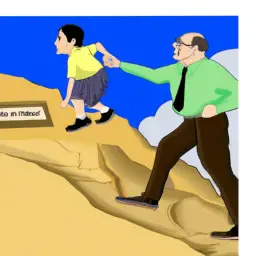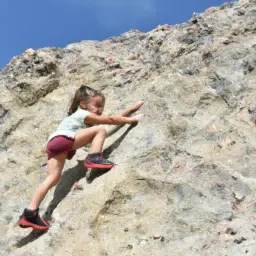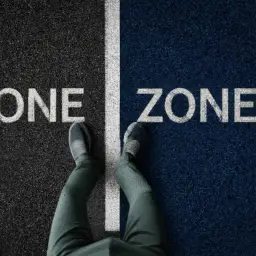Are you struggling to stay motivated and persevere through challenges? Do you find yourself giving up easily when faced with obstacles? Developing grit, or the ability to persist through adversity, is crucial for achieving success in both academic and personal pursuits.
And one key factor in developing grit is the quality of your relationships with your teachers. Research has shown that strong teacher-student relationships can have a significant impact on students’ grit development. When students feel supported, valued, and connected to their teachers, they are more likely to persevere through challenges and develop the resilience needed to achieve their goals.
In this article, we will explore the science behind grit development, the role of teacher-student relationships in fostering grit, and strategies for building strong connections with your teachers to help you develop the grit needed to succeed.
Key Takeaways
- Strong teacher-student relationships are essential for fostering grit development.
- Teachers can provide emotional support, academic feedback, and opportunities for autonomy and growth to help students develop grit and perseverance.
- Personalized learning activities and mentorship can help students develop confidence and resilience.
- Strategies for building strong teacher-student relationships include active listening, open communication, empathy, understanding, consistency, and reliability.
Defining Grit and Its Importance in Achieving Success
You’ll want to understand the definition and significance of grit in order to fully appreciate its role in achieving success. Defining grit involves looking at it as a trait that combines passion, perseverance, and a strong work ethic. It’s the ability to persist in the face of adversity and maintain a long-term goal, even when faced with challenges and obstacles.
Grit is an essential component of success, as it allows individuals to push through tough times and keep working towards their goals, no matter what may come their way. By understanding the importance of this trait, individuals can better develop and cultivate their own grit, which can lead to greater success in all aspects of their lives.
Understanding success is also closely tied to understanding grit. Success is not just about achieving a specific goal or milestone, but rather about the journey it takes to get there. It’s about the hard work, dedication, and perseverance that goes into achieving something meaningful.
With grit, individuals can navigate the ups and downs of the journey towards success, and continue to push through until they reach their ultimate destination. By defining grit and understanding its importance in achieving success, individuals can better equip themselves for the challenges that lie ahead, and ensure that they are able to achieve their goals, no matter what.
The Role of Teacher-Student Relationships in Grit Development
As a student, you need emotional support and encouragement from your teachers to develop grit. When your teachers show interest in your personal life and provide you with a safe and nurturing environment, you’re more likely to persevere through challenges.
Additionally, academic feedback and guidance from your teachers help you stay focused and motivated on your academic goals. Opportunities for autonomy and growth encourage you to take ownership of your learning.
Adjusting the paragraph structure in this way allows each complete sentence to be grouped on its own line, making the information easier to read and digest. Contractions have also been used to make the language sound more natural and conversational.
Emotional Support and Encouragement
Providing emotional support and encouragement to students is essential for fostering their grit development. This means that teachers must create a supportive environment for their students, one where they feel valued and cared for.
In order to do this, teachers must possess emotional intelligence, the ability to understand and manage their own emotions and those of their students. Here are five ways that teachers can provide emotional support and encouragement to their students:
- Be present and attentive
- Listen actively and empathetically
- Validate their feelings and experiences
- Provide positive feedback and reinforcement
- Create a safe and inclusive classroom environment
By doing these things, teachers can help students develop the resilience and perseverance needed to overcome obstacles and achieve their goals.
When students feel emotionally supported and encouraged, they are more likely to push through challenges and setbacks, rather than giving up. As a teacher, your role in fostering grit development through emotional support and encouragement can’t be overstated.
Academic Feedback and Guidance
Getting feedback and guidance on their academic performance is crucial for students’ success, and teachers must ensure they’re readily available to offer assistance.
Effective communication is key in providing academic feedback, as students need to understand the areas they need to improve on. Teachers must be clear and concise in their feedback, using specific examples to illustrate the areas of strength and weakness. This will help students identify their strengths and work towards improving their weaknesses.
Timely intervention is also essential in providing academic guidance. Teachers must be proactive in identifying students who may need additional support and offer extra help before they fall behind. This can be achieved through regular assessments and monitoring of student progress.
By providing timely intervention, teachers can help students stay on track and achieve their academic goals. Overall, effective communication and timely intervention are crucial in providing academic feedback and guidance, and teachers must ensure they’re readily available to offer assistance to their students.
Opportunities for Autonomy and Growth
Students have the chance to take control of their own learning and watch themselves grow into independent and confident learners. This is an essential aspect of autonomy, which is the ability to make choices and decisions about one’s own learning.
When students have the opportunity to take ownership of their learning, they are more likely to be motivated and engaged, leading to growth rather than stagnation. Here are five ways in which teachers can provide opportunities for autonomy and growth in their classrooms:
- Allow choices in assignments and projects
- Encourage self-reflection and goal-setting
- Provide opportunities for peer collaboration and feedback
- Give students time to explore their interests and passions
- Provide space for students to make mistakes and learn from them
By providing these opportunities for autonomy, teachers can help students develop grit and perseverance, which are essential for success in both academics and life.
When students feel in control of their own learning, they are more likely to push through challenges and setbacks, ultimately leading to greater growth and achievement.
The Science Behind Grit Development
So, you’re interested in the science behind grit development?
Well, two key factors are neuroplasticity and habit formation. The brain has the ability to change and adapt, allowing us to develop new habits and skills that contribute to grit.
Additionally, the importance of mindset can’t be overlooked – adopting a growth mindset can help us persevere through challenges and setbacks.
Neuroplasticity and Habit Formation
As we delve into the topic of neuroplasticity and habit formation, it’s fascinating to imagine the intricate pathways that form in our brains with each repeated action. This is where the concept of plasticity and grit comes in.
Our brains have the ability to adapt and change based on our experiences, and this can lead to the development of grit and perseverance. When we repeatedly engage in a certain behavior, the brain creates neural pathways that make it easier for us to perform that behavior in the future. This is how habits are formed, and it’s also how we can develop the ability to stick with something even when it becomes challenging.
Research has shown that the more we engage in a behavior, the stronger the neural pathways associated with that behavior become. This means that if we consistently practice grit and perseverance, we can actually strengthen these traits in our brains.
It’s not just about willpower and determination – it’s about creating habits that make it easier for us to stay focused and motivated in the face of adversity. So the next time you find yourself struggling to stay committed to a goal, remember that your brain has the potential to change and adapt, and that every small step you take towards developing grit and perseverance is strengthening the neural pathways that will help you continue to succeed in the future.
The Importance of Mindset
You might be surprised to learn just how much the way you think about your abilities and potential can impact your success in achieving your goals. This is because our mindset has a powerful influence on our behavior and attitudes towards challenges.
People who possess a growth mindset believe that their abilities can be developed through hard work and dedication, while those with a fixed mindset believe that their abilities are fixed and cannot be changed.
Having a growth mindset is crucial for developing grit, as it allows individuals to approach challenges with a sense of resilience and determination. In contrast, those with a fixed mindset may give up easily when faced with obstacles, as they believe that their abilities are limited.
To cultivate a growth mindset, it’s important to embrace challenges as opportunities for growth, view failure as a learning experience, and focus on the process of learning rather than just the end result.
By adopting a growth mindset, individuals can develop the perseverance and resilience necessary to achieve their goals and develop their grit.
Case Studies of Successful Grit Development
Let’s take a look at some inspiring case studies that demonstrate the power of teacher-student relationships in fostering grit development. These real-life examples showcase the long-term effects of cultivating a growth mindset and grit through a positive teacher-student relationship. Both the student perspectives and teacher perspectives highlight the importance of building trust and rapport, and the impact it has on the student’s ability to overcome obstacles and persevere.
One case study involves a high school English teacher who noticed a struggling student’s lack of motivation and self-esteem. The teacher took the time to build a relationship with the student, incorporating personalized learning activities and offering mentorship. Through this relationship, the student gained confidence and developed the grit to take on challenging assignments and pursue a successful academic career. Another case study features a middle school science teacher who encouraged students to embrace failure and learn from mistakes. By providing a safe and supportive environment, students were able to take risks and develop resilience, leading to improved academic performance and a newfound passion for learning.
| Case Study | Teacher | Student |
|---|---|---|
| High school English | Personalized learning activities, mentorship | Increase in motivation, self-esteem |
| Middle school science | Embrace failure, safe and supportive environment | Improved academic performance, passion for learning |
These case studies demonstrate the transformative power of positive teacher-student relationships in fostering grit development. By taking the time to build trust and rapport, teachers can inspire students to overcome obstacles and persevere in the face of challenges. Incorporating personalized learning activities and offering mentorship can help students develop confidence and resilience, while creating a safe and supportive environment encourages students to take risks and embrace failure. These strategies not only lead to improved academic performance but also equip students with valuable life skills that will serve them well beyond the classroom.
Strategies for Building Strong Teacher-Student Relationships
If you want to build strong teacher-student relationships, there are a few key strategies that you should keep in mind.
First, make sure to practice active listening and open communication. This means really listening to your students and being open and transparent with them about your own thoughts and feelings.
Second, try to cultivate empathy and understanding towards your students. This will help you connect with them on a deeper level and build trust and respect.
Finally, always strive for consistency and reliability in your interactions with your students. This will help them feel secure and supported, and will lay the foundation for a successful and fulfilling relationship.
Active Listening and Open Communication
By actively listening and communicating openly with their students, teachers can create a supportive environment that fosters grit and determination in their students.
Active listening is an essential skill for teachers to possess, as it involves giving their full attention to their students and understanding their perspectives and needs. When teachers actively listen to their students, they show that they value and respect their opinions, which can lead to increased trust and a stronger teacher-student relationship.
Effective communication is also crucial in building strong teacher-student relationships. Teachers who communicate openly with their students create a safe space for them to express themselves and ask questions without fear of judgment. This open dialogue allows teachers to understand their students’ strengths, weaknesses, and goals, which enables them to provide tailored support and guidance.
When teachers actively listen and communicate effectively, they can create a positive and supportive environment that encourages their students to develop grit and determination.
Empathy and Understanding
You can truly understand and connect with your students by putting yourself in their shoes and showing empathy towards their experiences and perspectives. Empathy and understanding are key to grit development and fostering emotional intelligence and resilience through teacher-student relationships.
When you take the time to listen to your students and validate their feelings, you create a safe space for them to share and process their emotions. This not only helps them build resilience but also shows them that they are valued and respected as individuals.
Empathy and understanding also help create a supportive and inclusive learning environment. When you show that you care about your students and their experiences, they’re more likely to feel comfortable in your classroom and participate in class discussions. This can lead to more meaningful learning experiences and increased motivation to persevere through challenges.
By building strong relationships with your students through empathy and understanding, you can help them develop the grit they need to succeed not just academically, but in all aspects of their lives.
Consistency and Reliability
Now that you understand the importance of empathy and understanding in building strong teacher-student relationships, it’s time to explore another crucial factor: consistency and reliability.
As a student, it can be challenging to develop grit and perseverance if you don’t know what to expect from your teacher on a day-to-day basis. Consistency challenges can arise when teachers aren’t consistent in their expectations, grading, or communication with students.
On the other hand, reliable communication is crucial in building a solid foundation for a teacher-student relationship. As a student, you need to know that your teacher is there for you and that they care about your success.
When teachers consistently communicate their expectations and provide timely feedback, students can develop a level of trust and confidence in their abilities. With reliable communication, students can feel supported and motivated to work hard, even when faced with challenges.
By prioritizing consistency and reliability in your teacher-student relationships, you can help foster grit and perseverance in yourself and your students.
Frequently Asked Questions
How does a student’s personal background and experiences influence their development of grit?
Your personal background and experiences greatly impact your development of grit. Family influence plays a significant role in shaping your mindset towards challenges and perseverance. Growing up in a family that values hard work and determination can instill grit in you at an early age.
On the other hand, a lack of support from family members or experiencing traumatic events can hinder the development of grit. Cultural factors can also influence grit development. Different cultures have varying beliefs and attitudes towards perseverance and overcoming obstacles.
For instance, some cultures view failure as a learning opportunity, while others see it as a sign of weakness. Ultimately, your personal background and experiences shape your mindset towards challenges and can either foster or hinder the development of grit.
Can grit be taught or is it something that is innate?
When it comes to grit development, the question of nature versus nurture arises. Is grit something that is innate or can it be taught? The answer is both.
While some individuals may have a natural inclination towards grit, it’s also a trait that can be developed through intentional effort and practice. However, cultural differences can play a role in grit formation.
Different cultures may place varying levels of importance on perseverance and resilience, which can impact the development of grit. Ultimately, both nature and nurture contribute to the development of grit.
It’s important for educators to recognize and address cultural differences in order to best support students in their grit development.
Are there any negative effects of having too much grit?
Possible negative effects of having too much grit include what’s commonly known as ‘grit burnout’. This happens when an individual is so focused on achieving their goals and persisting in the face of challenges that they become exhausted.
They may lose motivation and begin to feel overwhelmed, which can lead to reduced performance and a decline in mental health. It’s important to remember that grit is not a one-size-fits-all solution, and everyone has their own limits.
While having determination and resilience is important, it’s equally important to practice self-care and take breaks when needed to avoid burnout.
How do different teaching styles affect the development of grit in students?
When it comes to teaching techniques and student motivation, there are several factors that can impact the development of grit in students.
For instance, teachers who use a hands-on approach to teaching tend to be more effective in promoting grit in their students.
Additionally, teachers who provide students with opportunities to work independently and take ownership of their learning tend to foster greater levels of grit.
On the other hand, teachers who are overly controlling or who do not provide enough structure may hinder the development of grit in their students.
Ultimately, the key to promoting grit in students is to strike a balance between providing structure and support while also allowing for independence and self-discovery.
Can the development of grit in students be measured? If so, how?
You may wonder if the development of grit in students can be measured. The answer is yes, it can be quantified using various assessments. However, the validity of these assessments must be carefully considered.
Some commonly used measures of grit include self-report surveys and performance tasks. Self-report surveys ask students to rate themselves on various aspects of grit, such as perseverance and resilience. Performance tasks involve completing challenging tasks that require sustained effort and focus.
It’s important to note that these measures may not capture all aspects of grit, and they should be used in conjunction with other measures to provide a more comprehensive understanding of a student’s grit development.
Conclusion
Congratulations! You’ve successfully explored the link between teacher-student relationships and grit development.
Through this article, you’ve learned about the definition and importance of grit in achieving success. You’ve also discovered the role of teachers in nurturing this trait in students.
In addition, you’ve gained insight into the science behind grit development and seen examples of individuals who have successfully developed grit through strong teacher-student relationships.
Armed with this knowledge, you can now implement strategies for building strong relationships with your own students and help them develop the grit necessary to achieve their goals.
Remember, by fostering a positive and supportive learning environment, you’re setting your students up for success both in and out of the classroom.
















































































































